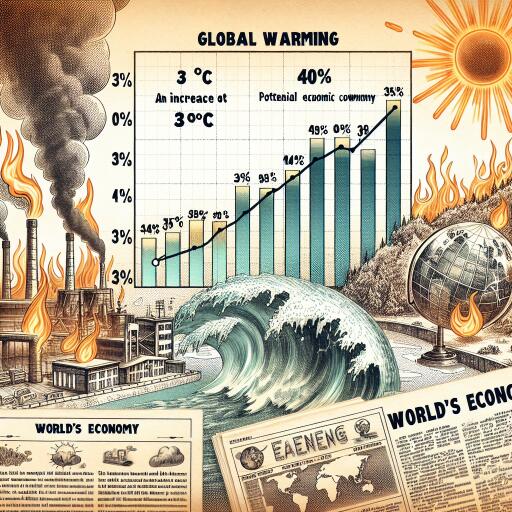
Global Warming of More than 3°C This Century May Wipe 40% off the World’s Economy, New Analysis Reveals
The devastating impact of climate change on the global economy has likely been grossly underestimated. Recent analysis highlights the potential economic ruin that might ensue if global temperatures continue to rise unchecked.
Historically, assessments regarding the effects of climate change on global Gross Domestic Product (GDP) predicted relatively modest impacts. This perception has contributed to a sluggish response from nations across the globe in cutting greenhouse gas emissions.
Intensifying Climate Extremes
The new research unveils a far grimmer scenario where warmer global temperatures could lead to a marked increase in extreme weather patterns. The domino effect that follows such environmental changes poses an ominous threat to global economies. The escalating frequency and severity of natural disasters—ranging from hurricanes and wildfires to droughts and floods—are not confined to geographic regions but have widespread repercussions across industries and economies worldwide.
A rise in global temperatures by more than 3°C could potentially decimate approximately 40% of the world’s economic output. This catastrophic projection goes beyond the current understanding and predictions which have thus far failed to fully grasp the intertwined complexities and extent of climate-driven economic disruption.
Interconnected Global Economy at Risk
As these climatic events intensify, sectors heavily reliant on natural resources and stable environmental conditions, such as agriculture, fisheries, and tourism, face dire consequences. The cascading effects will be felt across supply chains, leading to increased production costs and reduced profitability. Disruption in one part of the world has the potential to reverberate internationally, causing economic upheaval on a global scale.
From challenging agriculture and jeopardizing food security to disrupting trade routes and diminishing labor productivity due to extreme heat stress, the comprehensive impact is daunting. As the temperatures climb, energy demands for cooling will spike, further straining resources and worsening emissions unless addressed by substantial investments in sustainable energy solutions.
Rethinking Economic Resilience and Growth
The projections underscore the urgent need for a transformation in economic resilience strategies. Adaptive measures that protect economies from the shocks of climate change must be prioritized. Additionally, it is imperative to transition towards low-carbon economies, investing heavily in green technology and sustainable practices to mitigate the impending economic downfall.
Governments, businesses, and communities must collaborate to create a robust framework to withstand climate fallout. This includes forging international partnerships and implementing policies that prioritize climate risk in economic planning and development.
The Role of Policy and Innovation
Innovative solutions and policy interventions are crucial in averting an economic catastrophe. Legislation to enforce emission reductions, subsidies for renewable energy projects, and incentives for sustainable practices are vital components of a strategic response to climate threats. Furthermore, fostering innovation in carbon capture and storage technologies, along with enhancing reforestation efforts, will be critical in controlling future global temperature rises.
Increased awareness and action at both grassroots and government levels are imperative to initiate a collective movement towards sustainability. Public support for environmental policies can catalyze a shift in priorities, driving societal emphasis on ecological preservation alongside economic recovery.
Looking Forward
This analysis serves as a stark reminder to nations about the urgency of combatting climate change before economic damage becomes irreparable. While the potential economic loss outlined in the research is daunting, it also presents an opportunity to steer the future towards sustainable growth and development, benefiting both the planet and its people.
The path forward must be paved with immediate, decisive action to curb emissions and integrate sustainable practices into the heart of economic planning, ensuring a stable and resilient future for generations to come.





Leave a Reply